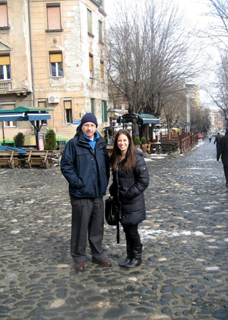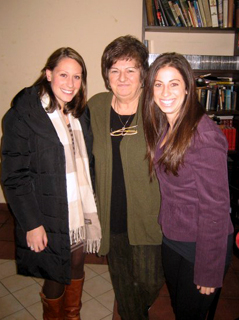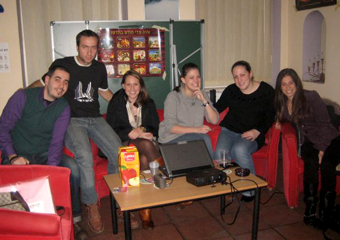My trip to Belgrade
Permanent link All Posts

Ariel with Rabbi Isak Asie, Serbia’s only rabbi
I recently returned from a whirlwind visit to Belgrade, Serbia. I ended up in Belgrade sort of randomly, after my friend Marissa invited me to join her for a weekend in Athens. We were discussing adding on to our trip in Europe, and Belgrade quickly became our number one choice; Marissa works for Rasky Baerlein Strategic Communications in Boston and one of her accounts is the Serbian Import and Expert Promotion Agency (check out an editorial she helped get placed in the NYT).
At first mention of Serbia, I thought of the American Jewish Joint Distribution Committee (JDC). As an employee of JUF, it’s extremely important to me to see how the dollars we raise are used. About half of the money JUF raises each year stays in Chicago and the other half is distributed abroad (mainly through two organizations, JDC and JAFI, the Jewish Agency for Israel). The JDC works in over 70 countries today, rescuing Jews in danger, providing relief to those in distress (they are doing amazing work in Haiti right now), revitalizing overseas Jewish communities, and helping Israel overcome the social challenges of its most vulnerable citizens. I know what JDC is all about through my work, but wanted to see it in action.
Prior to my visit to Belgrade, I emailed Ela, the JDC contact in Belgrade, who went above and beyond to make sure that Marissa and I had everything arranged for our trip. In addition to agreeing to show us around, she offered to book our hotel, pick us up from the airport and arrange a tour for us around the city!

Ariel (right) and Marissa with Ela
The Jewish community in former Yugoslavia was majorly affected during WWII and about 60,000 Jews were killed in this region. Roughly 10,000 Jews lived in Belgrade before the Holocaust, and only around 2,000 Jews presently reside there. The only synagogue in Belgrade today was used as a night club and brothel during WWII. Our first stop on the Jewish Belgrade tour was this synagogue (Beit Haknesset Sukat Shalom) which also serves as a community center offering programs for the older adult community (which serves many Holocaust survivors), adult/student/youth activities (clubs and weekend programs), a kosher kitchen (the only kosher kitchen in Belgrade), and the center of Jewish activities in Belgrade. While at the center, we met with the program coordinators, attended an elderly event with a comedian (although we couldn’t understand the jokes since they were in Serbian, we heard it was very funny), purchased local crafts made by some of the women in the community, and ate lunch with several of the leaders in the Jewish community.

Ariel (right) with the Belgrade synagogue’s program coordinators
We also had the incredible opportunity of not only meeting Serbia’s only rabbi, but spending most of the day with him. Rabbi Isak Asiel serves as the community’s leader; running the services, butchering animals, conducting funerals, teaching classes, and serving as a public figure for the Jewish community. We went with the rabbi to pick his daughter up from school and ended up on a tour of an old Jewish area in Belgrade. Remnants of Jewish artifacts and writings can be found in the neighborhoods that were once predominately Jewish. We passed a public school and the rabbi showed us a plaque that read “The computer lab in this school is donated and supported by JDC.” I was shocked and proud to see the far-reaching scope of JDC’s efforts. I was impressed to see JDC on the wall of this public school providing non-sectarian long-term development assistance in Belgrade. The rabbi then began to tell me some of the specific things that JDC supports in the Jewish community, including financial assistance for the synagogue remodeling and money for Shabbat dinners, and I was beyond impressed. Our tour ended with a visit to a mosque. The rabbi wanted to stop by and introduce us to his good friend the imam. As we walked back to the synagogue, he told us how important it is to him to build relationships with the Muslim and other minority communities.
The Jewish community in Belgrade has come a long way, yet there is still a lot of work to do moving forward. I was impressed to see that despite the many challenges (including the Holocaust and the hardships of living in a nation plagued by many wars in the 1990s) the Jewish community in Belgrade is fighting to remain strong. In recent years they have worked to create an amazing community center and programs that strengthen individual and collective Jewish identity.
This community’s hospitality and welcoming attitude toward us epitomized the strength of the Jewish community worldwide. I have never felt so comfortable and welcome anywhere in the world, besides Israel. This reminds me of the saying: “Kol Yisrael arevim zeh bazeh (All Israel is responsible for one another).” Not only does this saying describe the way we were treated in Belgrade, this exemplifies the mission of JDC and how they operate. The work that JDC conducts daily exemplifies the Jewish way of thought, the idea that we are responsible for one another. I am proud to be a part of a community that cares for people worldwide and feel fortunate to have had the experience to visit the unique and wonderful Jewish community in Belgrade.



.jpg)



